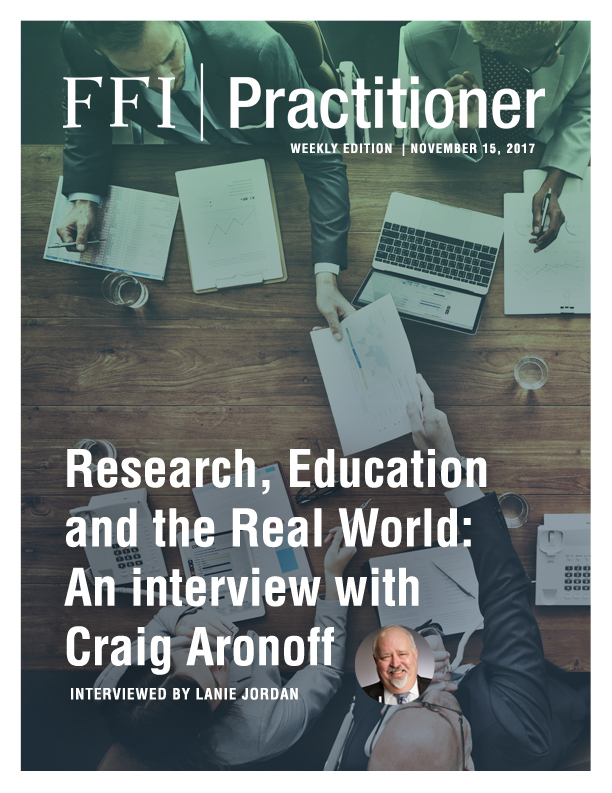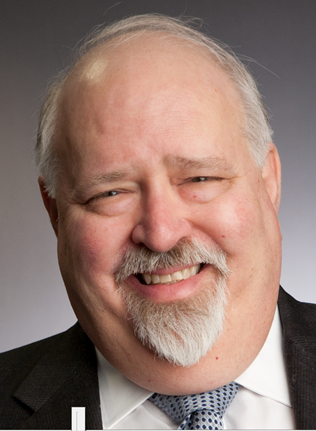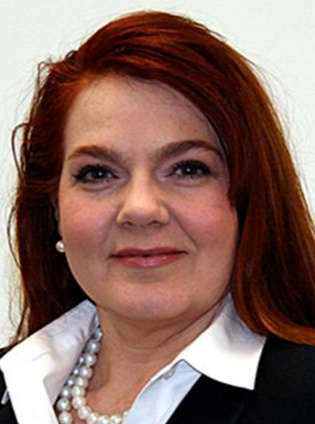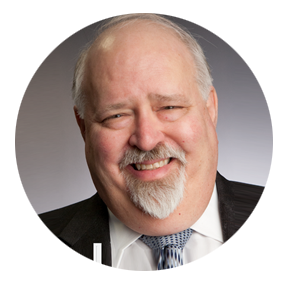Editions Viewable On Any Device.

From FFI Practitioner
Thanks to Lanie Jordan, co-chair of FFI Practitioner editorial committee for her interview with Craig Aronoff, FFI Fellow and past president, and principal of The Family Business Consulting Group. This interview is based on Craig’s October 28 presentation, “Research, Education and the Real World,” at the 2017 FFI Research & Education symposium.

Through the years, how have you seen research influence the field of family business?

Well, I hate to sound like an academic, but first I have to ask, what do you mean by research? To me it is a very interestingly broad term, although it could be interpreted as a very interestingly narrow term. I assume you’re asking me about academic research, but you know, when I think about research, I think about the clients I’m engaged with.
The first thing I do is collect a tremendous amount of data from them, and I do that pretty systematically. I ask them for similar things and there are about 15 to 20 categories of materials and information that I ask for. I also Google them and gather information about them in that respect. And then I interview a large number of people who are significant players in the family business system.
So much of the time that I spend in my consulting work, certainly in the early stages, is research and I consider it fairly disciplined, fairly structured, and fairly focused, but it’s focused on understanding that particular family business system, in all of its dimensions. Now, something tells me that’s not the kind of research that you’re asking me about when you ask me about how I’ve seen research influence the family business. The first thing I’d say is that disciplined professional practitioners practice by, in the initial stages of their engagements, involving themselves in very significant research as it relates to the particular client or subject that they are dealing with.
And in this sense it’s structured, in the sense that you make every effort to make it objective, and not in the “scientific method” sense of isolating variables. Because we inherently see these as extremely complex systems with a whole lot of interacting variables, which makes the greatest wisdom that you can bring to a family system, the question what are we trying to understand here, what are we trying to achieve here, and what does it depend on, which means, how is the system structured to produce whatever it’s producing so that we can evaluate it, analyze it, and perhaps intervene in ways that will improve the operation of the system as it relates to the goals of the constituents?
Sidebar

FBR editor, Pramodita Sharma, puts the oft quoted 30-13-3 statistic on family enterprise longevity into its historical context and provides new thinking and research on how to understand and plan for generational transitions in family enterprises.
Well, that was a surprise answer! Can we circle back to your correct assumption that I was asking about academic research?
Of course…unfortunately, the impression I have is that academic research, and what we do in the field, seem to exist in parallel universes which hardly touch. And my greatest desire, and my greatest advice, is that the professional’s field research and the academic’s research touch each other much more extensively, much more intimately, much more meaningfully so that there would be more opportunity for what’s going on in the real world of family businesses to impact what it is that researchers are trying to understand. That way, what researchers are trying to understand can be more broadly translated into meaningful activity as it relates to actual family businesses and their goals and their needs.
I’ve seen a few pieces of research that have had a significant influence, some of them are very simplistic. You know the old statistic about one-third of family businesses survive in each generation?
That’s all based on a little piece of research that John Ward did years and years ago when he used an industrial directory in Illinois from the 1920s and he looked at businesses that existed then and tracked them to see how long they had stayed in business. And what he found was that about a third of them survive in each generation. For some that’s become gospel and many, many people use that statistic and almost nobody knows where it comes from – let alone whether John’s results are universally applicable!
And then there’s been survey research, which suggests that the average age of family businesses is going to be 24- 25 years, whatever the industry may be. There have been long scale survey research efforts going back to what we did with Mass Mutual over 20 years ago. There’s also been good research on the economic impact of family businesses by my colleague Joe Astrachan and his colleagues. There was another kind of strategic related research that Danny Miller and Isabelle Le Breton-Miller did for their wonderful book Managing for the Long Run. And I’ve recently seen what I consider to be some good research coming out of very mature individuals who are in the field. Dennis Jaffe is a good example, especially the white papers that he’s produced which are based on in-depth interviews with a significant number of family businesses, and more importantly, are based on his entire career as both a researcher and a practitioner.
So, I have seen research that has some influence on the field of family business. But, given the amount of energy that’s been going into academic research, I must say that I’m somewhat disappointed in its productivity, and in the applicability and effectiveness of that output.
“…in family business there is more and more research about less and less. We are in danger of knowing everything about nothing.”
Do you have some tips for practitioners on how to both influence and utilize research?
Well, I’m wondering if we’re not putting the responsibility on the wrong foot, as it were. What can practitioners do? We can read the research, and we can access the research looking for opportunities to apply it to our clients. But I think there’s an obligation on the part of the researchers to do something more than merely get peer-reviewed acceptance – to do research that has a practical and actual application, making a difference in the real world. Unfortunately, as a highly distinguished leader in our field, put it to me, in family business there is more and more research about less and less. We are in danger of knowing everything about nothing.
So I think the obligation is not as much with the practitioners, although a lot of us really do try to keep up with the literature, and really do try to sort things out, and really do try to fight our way through the research language to translate the findings into something that’s applicable in practice. Researchers could help by presenting their findings in language accessible to family business participants.
On the other hand, can practitioners help researchers get a better understanding of what’s actually going on out there in the field? The answer is yes, if the researchers are willing and able to engage with the field and be exposed to real businesses. For example, our consulting group collectively has worked with two or three thousand family companies, at least. It’s a huge sample. Having said that, I recognize that our clients are self-selected, so it’s also a biased sample. So, they don’t represent all family businesses by any means, but they represent family businesses who are seeking help toward achieving goals related to their continuity over time.
I also think that there are a bunch of old-timers at this point, who were in the first or second wave of FFI members – people with a tremendous amount of experience. I believe that researchers should be picking the brains of these very seasoned practitioners and formulating questions to get them to think through all of their clients — what they’ve seen and what they’ve learned, and what’s been helpful and what has not.
There’s a massive amount of knowledge, gathered from experience, in these practitioners that could be accessible to researchers if the researchers wanted to access it.
Craig, thank you so much for sharing your thoughts on research, education and the real world with the readers of FFI Practitioner.

About the contributors
Craig Aronoff, past president of FFI and recipient of the Richard Beckhard Practice Award, is co-founder and principal of The Family Business Consulting Group, Inc. An FFI Fellow, he is a leading consultant, speaker, writer and educator in the family business field. He is the founder of the Cox Family Enterprise Center and current professor emeritus at Kennesaw State University in Marietta, GA.

Lanie Jordan, FFI Fellow, is co-chair of FFI Practitioner editorial committee. Formerly the executive director of the Sidhu School of Business at Wilkes University, she is currently the vice president of family business marketing network at NxtGen Nexus.
Related Article
If you enjoyed this article, view the related article that addresses research on practice in the family enterprise field.



